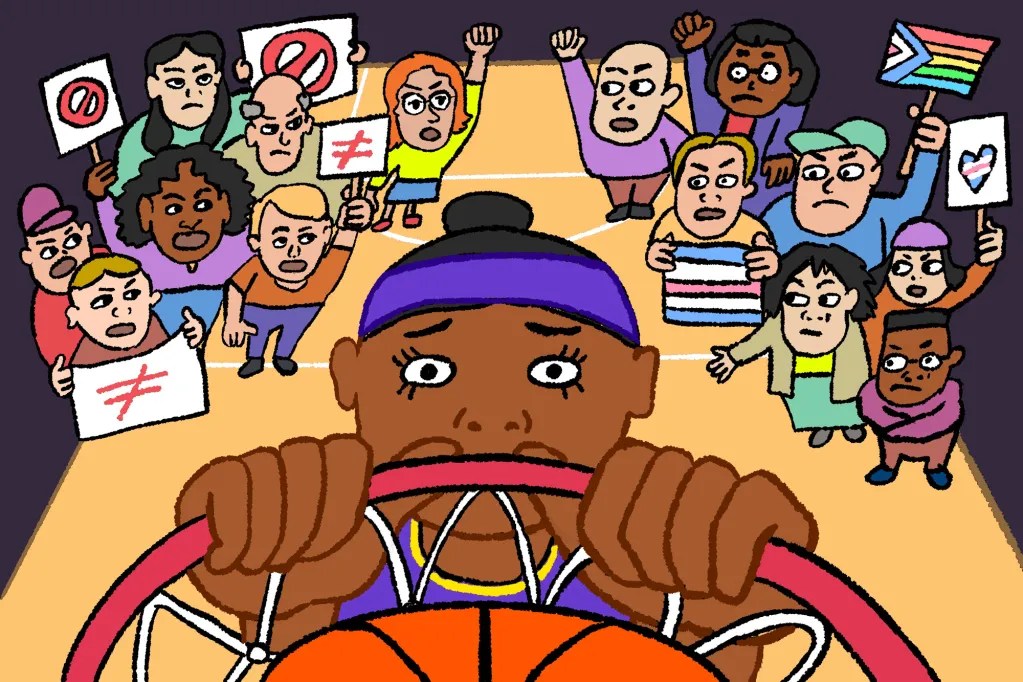BY DESMOND MEAGLEY AND AMY ELISABETH MOORE | CalMatters
Despite broad protections for transgender student athletes, California has become the latest battleground in the growing national movement to remove them from women’s college sports.
In one case, two public universities in California are leaving the National Association of Intercollegiate Athletics after it imposed a ban in April on transgender athletes participating in women’s sports.
In a much more publicized case, four teams in the National Collegiate Athletic Association’s Mountain West Conference have forfeited games against San José State’s volleyball team this fall after one of its players identified a teammate as transgender and joined a lawsuit against the NCAA, opposing its policy allowing transgender women to compete in women’s sports. Last Wednesday, volleyball players from those universities filed a separate lawsuit against the conference, the conference commissioner, and California State University officials for the same reason.
RELATED: New lawsuit explicitly targets San Jose State over transgender volleyball firestorm
“California has robust non-discrimination protections for LGBTQ+ students, specifically transgender students, at all levels,” said Tony Hoang, executive director for Equality California, a nonprofit civil rights organization.
California is one of 24 states in the country that allow transgender student athletes to play on sports teams that match their gender identity. California enshrines protections for transgender students in the state education code and in policies for all three public college and university systems. Transgender athletes are allowed to compete by the largest athletic associations operating in the state — the California Interscholastic Federation at the secondary level, and the California Community College Athletic Association and the NCAA at the collegiate level. California goes further, even, than the U.S. Department of Education, which has yet to enact proposed protections for transgender athletes in its Title IX anti-discrimination policy.
Despite all of this, transgender athletes in California are still susceptible to legal and social pressures playing out across the country. Twenty-six states ban transgender women from competing in women’s sports at any level. In some of those states, lawsuits against national athletics organizations are sweeping California into the battle.
President-elect Donald Trump has said he will ban transgender students from competing in sports altogether. “We’re not going to let it happen,” he said on Oct. 15 at a town hall in Georgia when he was asked about transgender athletes in women’s sports.
Shiwali Patel, the National Women’s Law Center’s senior director of safe and inclusive schools, called bans on trans athletes “attempts to weaponize civil rights law to justify discrimination against an already vulnerable group of students.”
Since AB 1266 took effect in 2014, California students from K-12 to collegiate levels have had the right to “participate in sex-segregated school programs and activities, including athletic teams and competitions, and use facilities consistent with his or her gender identity, irrespective of the gender listed on the pupil’s records.”
The onus is on public colleges and universities, and not athletics associations, to adhere to California’s protections for transgender student athletes. However, the mounting pressure against athletics associations is affecting California college athletes nonetheless.
Lawsuit against NCAA gains momentum
So far this fall, the women’s volleyball teams at Boise State University in Idaho, Utah State University, University of Wyoming, and The University of Nevada, Reno, have forfeited conference matches against the San José State University Spartans. The forfeits came after Brooke Slusser, a San José State player, publicly claimed that one of her teammates is transgender. In statements to the press, Slusser has argued that the teammate poses a physical risk to other women players during practice and competitions. CalMatters is not naming the teammate to preserve her privacy. San Jose State has not confirmed whether the student is transgender.
In September, Slusser joined more than a dozen other female athletes in the Georgia-based lawsuit Gaines v. NCAA, filed in March. According to the suit, the plaintiffs allege that transgender athletes “disproportionately burden female athletes by reducing female competitive opportunities, forcing female athletes to compete against males in sex-separated sports, depriving women of equal opportunities to protect their bodily privacy, and authorizing males to access female safe spaces necessary for women to prepare for athletic competition, including showers, locker rooms and restrooms.”
Last week, on Nov. 13, Slusser and 11 other plaintiffs from colleges in the Mountain West Conference filed a lawsuit in Colorado claiming the NCAA, the conference, San José State and other universities “have engaged in a purposeful and illegal assault on the rights of women athletes” by allowing transgender athletes to compete. The suit calls for transgender women to be deemed ineligible to compete on women’s teams. Attorneys representing the plaintiffs in both lawsuits did not respond to interview requests.
Brooke Slusser, #10 of the San Jose State Spartans, serves the ball during the first set against the Air Force Falcons at Falcon Court at East Gym in Colorado Springs, Colorado on Oct. 19, 2024. Photo by Andrew Wevers, Getty Images
Related Articles
Transgender-rights advocates say the election of Trump and his allies marks a major setback
New lawsuit explicitly targets San Jose State over transgender volleyball firestorm
Trump hammered Democrats on transgender issues. Now the party is at odds on a response
Ted Olson dies at 84; conservative attorney argued on behalf of same-sex marriage cases
Trump pledged to roll back protections for transgender students. They’re flooding crisis hotlines
At San José State, “there have been no reported injuries involving either our team or opponents,” said Michelle Smith McDonald, the university’s senior director of media relations. “We don’t anticipate any changes to our current roster between now and the end of the season.”
San José State student athletes are governed under the NCAA and Mountain West Conference policies and the college adheres to Cal State anti-discrimination policies. San José State will stay in the Mountain West Conference through the 2031-32 school year, according to Smith McDonald.
“The Mountain West Conference prioritizes the best interests of our student-athletes and takes great care to adhere to NCAA and [Mountain West] policies,” according to a statement provided by Javan Hedlund, senior associate commissioner of the conference. He did not comment on the Colorado lawsuit.
The National Women’s Law Center also joined Gaines v. NCAA as a defendant on behalf of the association, arguing in its legal filing that “while Plaintiffs purport to speak on behalf of all women, they do not represent the interests of women who are transgender and want to continue participating in NCAA sports, nor the cisgender women who want to continue participating with them.”
The National Women’s Law Center has advocated for gender equity in sports since its founding in 1972, the year Title IX was enacted. “We know that trans inclusive school policies around sports are essential to fulfill Title IX’s broad promise of protecting well-being and education opportunities for all women and girls,” Patel said.
If the plaintiffs prevail at the district court, Patel said the case will go to an appellate court. Because the Biden administration has not enacted a proposed Title IX policy for transgender athletes, uncertainty remains within the courts, Patel said. “But what we do know is that the circuit courts that have heard this issue, have come out in favor of trans student athletes,” she said.
Members of the NCAA Gender and Equity Task Force did not respond to CalMatters’ multiple requests for comments.
The potential impact of banning transgender athletes
For transgender student athletes, the significance of having access to team sports goes beyond fairness. States with anti-trans laws show worse mental health outcomes for transgender youth. Bonnie Sugiyama, the director of San José State’s PRIDE Center, said transgender students particularly stand to benefit from access to sports in school.
“You get leadership skills, you get community, it’s great for your mental health to be able to play,” Sugiyama said. “To restrict people based on their identity … just because you don’t know where to put them? That’s not really an acceptable response.”
As a lifelong multi-sport athlete and former high school basketball coach, Sugiyama understands that athletics associations must create policies that cultivate a safe and fair playing field.
Sugiyama points out that blanket bans on transgender women don’t take into account whether an individual took hormone suppressants before adolescence, which has a major impact on how the body develops, nor do bans reflect how trans athletes compare to the range of physical traits of the average cisgender player of their sport.
“We should be talking about opportunities for everybody,” Sugiyama said. “At the end of the day, people just want to be able to play sports.”
Transgender athlete bans impact all athletes, research has found. A Center for American Progress report using CDC data says that in states that banned trans students from playing with their peers, fewer girls overall are playing school sports.
“On the other hand, where states include and support trans students, more girls are playing sports,” Patel said.
Federal anti-discrimination policies are unclear on transgender athletes
Transgender students were first written into Title IX in 2016 when the Obama administration specified that students could participate in sex-segregated activities and access bathrooms and locker rooms consistent with their gender identity. Former Secretary of Education Betsy DeVos rescinded those protections during Trump’s first presidency. On Aug. 1, the Biden administration enacted new protections for transgender students, reversing DeVos’ revision but not including protections for transgender athletes specifically. The Biden administration has not provided a reason for the omission.
The renewed Title IX policies met backlash across the country even before they were enacted. At least eight lawsuits resulted in injunctions in 26 states blocking the revisions from taking effect.
“Instead of focusing on the true mission of Title IX, which is to protect women and girls from discrimination in education and to protect and promote women’s and girls’ sports, the Defendants attempt to rewrite it entirely [to] institutionalize the left-wing fad of transgender ideology in our K-12 system and tie school funding to it,” one lawsuit out of Kansas reads.
A national injunction resulting from the Kansas lawsuit included more than 300 California K-12 schools and at least 50 colleges and universities, but those schools are still obligated to follow California’s education code.
“Federal law is the law of the land. But states are allowed to pass laws that go above and beyond what federal law does, and California has done that,” said Jennifer Chou, a civil rights lawyer who is the American Civil Liberties Union Northern California’s head of gender, sexuality and reproductive justice.
Athletics associations fracturing on transgender athlete issue
Without clear Title IX protections for transgender athletes, athletics associations across the nation have established their own policies governing the participation of trans students in college sports. In April, the National Association of Intercollegiate Athletics banned transgender women from participating in their women’s leagues. The association has 237 member universities across the U.S., including nine private institutions in California and two public four-year universities.
In September, Cal Maritime decided to separate from the association by June 2025. UC Merced also announced its intent to leave the association and join the NCAA starting in fall 2025.
According to Cal Maritime’s chief of staff, Karyn Cornell, interim president Michael Dumont’s review of the education code drove the split from the association. In a letter to the campus, Dumont explained that the association’s ban on transgender students contravenes state law and California State University policies, and affirmed the university’s commitment to provide “an inclusive and equitable community that values diversity and fosters mutual respect.”
“They’re doing the right thing, and they’re standing up for people like me, which is good,” said former Cal Maritime student Sophie Scopazzi, who once pushed for gender-neutral uniforms at the university. In November 2021, Scopazzi filed a Title IX complaint when some Cal Maritime student leaders sent emails and tweets with hateful, anti-LGTBQ+ comments. Then-President Thomas Cropper called the language “offensive” but said it was protected free speech. Scopazzi appreciates Dumont’s actions now.
“It’s nice to have a president that’s willing to say, ‘This is against our values. What they’re doing in [other states] is against what we stand for here at Cal Maritime,’” said Scopazzi, who graduated in 2023.
While there are over a dozen collegiate athletic associations in the United States, the NCAA and the NAIA are the primary national associations for four-year universities. The NCAA has over 1,000 institution members nationally, with 60 in California.
The NCAA’s policy on transgender athletes, established in 2011, is currently “under review.” In April, the NCAA Board of Governors discussed transgender student athletes but did not propose changes to the policy, which was last updated in 2022. The current NCAA policy aligns with the International Olympic Committee’s guidelines for transgender athletes, which ensure that competition is “fair and safe and that athletes are not excluded solely on the basis of their transgender identity or sex variations.”
The committee leaves it to each sports’ governing body to determine its eligibility criteria for inclusion based on hormone levels. In the case of male to female transgender athletes who compete in women’s sports, these criteria typically require hormone level testing at different intervals preceding competitions.
Most community colleges in California also require certain testosterone levels for transgender women to compete in women’s sports. In California, 110 community colleges participate in the state-established California Community College Athletic Association.
“Under 3C2A policy, transgender men and women may compete on men’s teams, but trans women may not compete on women’s teams unless they have completed at least one calendar year of testosterone suppression treatment for gender transition,” according to Mike Robles, director of communications for the association.
Civil rights advocates who spoke with CalMatters believe that attempts to enact anti-transgender policies will fail in California. Hoang of Equality California also believes the lawsuit against the NCAA will be thrown out.
“An overwhelming majority of courts have consistently upheld legal protections for transgender individuals, particularly in cases involving anti-discrimination laws, and we’re hopeful that this case won’t be going anywhere, and it is a publicity stunt,” he said.
CalMatters is covering the impact of the national fight over transgender students in California college athletics. Do you have a story to share? Reach out to the College Journalism Network at [email protected].
Amy Elisabeth Moore and Desmond Meagley are fellows with the College Journalism Network, a collaboration between CalMatters and student journalists from across California. CalMatters higher education coverage is supported by a grant from the College Futures Foundation.


